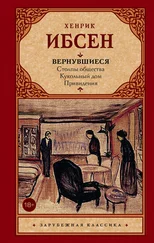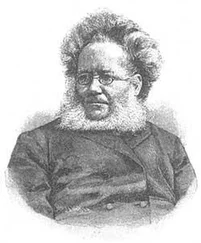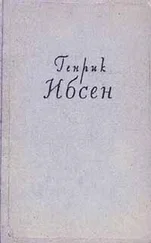Генрик Ибсен - Ghosts
Здесь есть возможность читать онлайн «Генрик Ибсен - Ghosts» весь текст электронной книги совершенно бесплатно (целиком полную версию без сокращений). В некоторых случаях можно слушать аудио, скачать через торрент в формате fb2 и присутствует краткое содержание. Год выпуска: 2014, Издательство: epubBooks Classics, Жанр: Драматургия, на английском языке. Описание произведения, (предисловие) а так же отзывы посетителей доступны на портале библиотеки ЛибКат.
- Название:Ghosts
- Автор:
- Издательство:epubBooks Classics
- Жанр:
- Год:2014
- ISBN:нет данных
- Рейтинг книги:3 / 5. Голосов: 1
-
Избранное:Добавить в избранное
- Отзывы:
-
Ваша оценка:
- 60
- 1
- 2
- 3
- 4
- 5
Ghosts: краткое содержание, описание и аннотация
Предлагаем к чтению аннотацию, описание, краткое содержание или предисловие (зависит от того, что написал сам автор книги «Ghosts»). Если вы не нашли необходимую информацию о книге — напишите в комментариях, мы постараемся отыскать её.
Ghosts — читать онлайн бесплатно полную книгу (весь текст) целиком
Ниже представлен текст книги, разбитый по страницам. Система сохранения места последней прочитанной страницы, позволяет с удобством читать онлайн бесплатно книгу «Ghosts», без необходимости каждый раз заново искать на чём Вы остановились. Поставьте закладку, и сможете в любой момент перейти на страницу, на которой закончили чтение.
Интервал:
Закладка:
Ghosts
A Domestic Tragedy in Three Acts
Henrik Ibsen
Introduction
The winter of 1879–80 Ibsen spent in Munich, and the greater part of the summer of 1880 at Berchtesgaden. November 1880 saw him back in Rome, and he passed the summer of 1881 at Sorrento. There, fourteen years earlier, he had written the last acts of Peer Gynt ; there he now wrote, or at any rate completed, Gengangere . It was published in December 1881, after he had returned to Rome. On December 22 he wrote to Ludwig Passarge, one of his German translators, "My new play has now appeared, and has occasioned a terrible uproar in the Scandinavian press; every day I receive letters and newspaper articles decrying or praising it…. I consider it utterly impossible that any German theatre will accept the play at present. I hardly believe that they will dare to play it in the Scandinavian countries for some time to come." How rightly he judged we shall see anon.
In the newspapers there was far more obloquy than praise. Two men, however, stood by him from the first: Björnson, from whom he had been practically estranged ever since The League of Youth , and Georg Brandes. The latter published an article in which he declared (I quote from memory) that the play might or might not be Ibsen's greatest work, but that it was certainly his noblest deed. It was, doubtless, in acknowledgment of this article that Ibsen wrote to Brandes on January 3, 1882: "Yesterday I had the great pleasure of receiving your brilliantly clear and so warmly appreciative review of Ghosts …. All who read your article must, it seems to me, have their eyes opened to what I meant by my new book—assuming, that is, that they have any wish to see. For I cannot get rid of the impression that a very large number of the false interpretations which have appeared in the newspapers are the work of people who know better. In Norway, however, I am willing to believe that the stultification has in most cases been unintentional; and the reason is not far to seek. In that country a great many of the critics are theologians, more or less disguised; and these gentlemen are, as a rule, quite unable to write rationally about creative literature. That enfeeblement of judgment which, at least in the case of the average man, is an inevitable consequence of prolonged occupation with theological studies, betrays itself more especially in the judging of human character, human actions, and human motives. Practical business judgment, on the other hand, does not suffer so much from studies of this order. Therefore the reverend gentlemen are very often excellent members of local boards; but they are unquestionably our worst critics." This passage is interesting as showing clearly the point of view from which Ibsen conceived the character of Manders. In the next paragraph of the same letter he discusses the attitude of "the so–called Liberal press"; but as the paragraph contains the germ of An Enemy of the People , it may most fittingly be quoted in the introduction to that play.
Three days later (January 6) Ibsen wrote to Schandorph, the Danish novelist: "I was quite prepared for the hubbub. If certain of our Scandinavian reviewers have no talent for anything else, they have an unquestionable talent for thoroughly misunderstanding and misinterpreting those authors whose books they undertake to judge…. They endeavour to make me responsible for the opinions which certain of the personages of my drama express. And yet there is not in the whole book a single opinion, a single utterance, which can be laid to the account of the author. I took good care to avoid this. The very method, the order of technique which imposes its form upon the play, forbids the author to appear in the speeches of his characters. My object was to make the reader feel that he was going through a piece of real experience; and nothing could more effectually prevent such an impression than the intrusion of the author's private opinions into the dialogue. Do they imagine at home that I am so inexpert in the theory of drama as not to know this? Of course I know it, and act accordingly. In no other play that I have written is the author so external to the action, so entirely absent from it, as in this last one."
"They say," he continued, "that the book preaches Nihilism. Not at all. It is not concerned to preach anything whatsoever. It merely points to the ferment of Nihilism going on under the surface, at home as elsewhere. A Pastor Manders will always goad one or other Mrs. Alving to revolt. And just because she is a woman, she will, when once she has begun, go to the utmost extremes."
Towards the end of January Ibsen wrote from Rome to Olaf Skavlan: "These last weeks have brought me a wealth of experiences, lessons, and discoveries. I, of course, foresaw that my new play would call forth a howl from the camp of the stagnationists; and for; this I care no more than for the barking of a pack of chained dogs. But the pusillanimity which I have observed among the so–called Liberals has given me cause for reflection. The very day after my play was published the Dagblad rushed out a hurriedly–written article, evidently designed to purge itself of all suspicion of complicity in my work. This was entirely unnecessary. I myself am responsible for what I write, I and no one else. I cannot possibly embarrass any party, for to no party do I belong. I stand like a solitary franc–tireur at the outposts, and fight for my own hand. The only man in Norway who has stood up freely, frankly, and courageously for me is Björnson. It is just like him. He has in truth a great, kingly soul, and I shall never forget his action in this matter."
One more quotation completes the history of these stirring January days, as written by Ibsen himself. It occurs in a letter to a Danish journalist, Otto Borchsenius. "It may well be," the poet writes, "that the play is in several respects rather daring. But it seemed to me that the time had come for moving some boundary–posts. And this was an undertaking for which a man of the older generation, like myself, was better fitted than the many younger authors who might desire to do something of the kind. I was prepared for a storm; but such storms one must not shrink from encountering. That would be cowardice."
It happened that, just in these days, the present writer had frequent opportunities of conversing with Ibsen, and of hearing from his own lips almost all the views expressed in the above extracts. He was especially emphatic, I remember, in protesting against the notion that the opinions expressed by Mrs. Alving or Oswald were to be attributed to himself. He insisted, on the contrary, that Mrs. Alving's views were merely typical of the moral chaos inevitably produced by re–action from the narrow conventionalism represented by Manders.
With one consent, the leading theatres of the three Scandinavian capitals declined to have anything to do with the play. It was more than eighteen months old before it found its way to the stage at all. In August 1883 it was acted for the first time at Helsingborg, Sweden, by a travelling company under the direction of an eminent Swedish actor, August Lindberg, who himself played Oswald. He took it on tour round the principal cities of Scandinavia, playing it, among the rest, at a minor theatre in Christiania. It happened that the boards of the Christiania Theatre were at the same time occupied by a French farce; and public demonstrations of protest were made against the managerial policy which gave Tête de Linotte the preference over Gengangere . Gradually the prejudice against the play broke down. Already in the autumn of 1883 it was produced at the Royal (Dramatiska) Theatre in Stockholm. When the new National Theatre was opened in Christiania in 1899, Gengangere found an early place in its repertory; and even the Royal Theatre in Copenhagen has since opened its doors to the tragedy.
Читать дальшеИнтервал:
Закладка:
Похожие книги на «Ghosts»
Представляем Вашему вниманию похожие книги на «Ghosts» списком для выбора. Мы отобрали схожую по названию и смыслу литературу в надежде предоставить читателям больше вариантов отыскать новые, интересные, ещё непрочитанные произведения.
Обсуждение, отзывы о книге «Ghosts» и просто собственные мнения читателей. Оставьте ваши комментарии, напишите, что Вы думаете о произведении, его смысле или главных героях. Укажите что конкретно понравилось, а что нет, и почему Вы так считаете.








